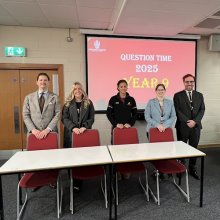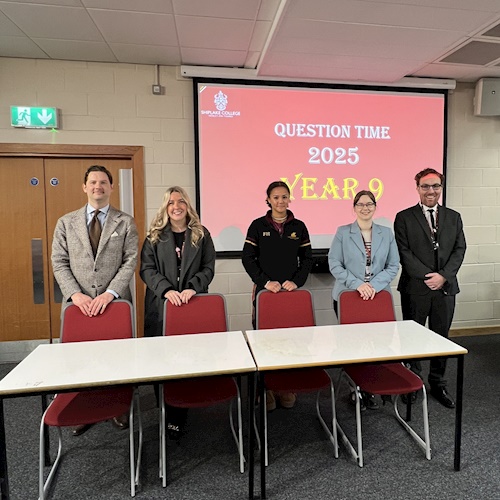
Year 9 stepped into the spotlight for their very first Question Time, hosted by Mr Player, who introduced the format with the confidence of someone who’s seen a fair few of these panels and knows exactly how lively they can get if the audience isn’t paying attention.
This was Year 9’s chance to hear staff (and a sixth form voice) tackle some of the big questions they submitted themselves, covering everything from phone use to US politics. And Year 9 were not disappointed... on the panel was a megastar team with Mr Shaw, Miss James, Mrs Hendriks, and Year 13’s Felicity Hudson facing the questions.
Why can't we use our phones between lessons?
Mr Shaw opened with a psychological reminder: the brain simply can’t do two things at once. Typing on a phone while trying to listen, he explained, is a recipe for distraction, not productivity. Miss James added that life already throws enough problems their way; phones simply pile more on top. Removing the distraction removes the issues that come with it.
Mrs Hendriks brought a different angle: content. “Can we trust what’s being accessed?” she asked, before noting how refreshing it is to see pupils chatting, laughing, and roaming around without phones. “It would be totally different if everyone had them out.”
Felicity Hudson provided the pupil perspective: many pupils choose not to use their phones while talking to friends. Outside of lessons, she argued, phones aren’t inherently harmful as it’s all about balance, and most pupils know when to switch off.
What do we think of Donald Trump?
Mr Shaw admitted his own politics don’t align with Trump’s but highlighted something interesting: Trump answers questions directly. Whether people trust him or not, he sounds straightforward and that creates its own kind of loyalty. Miss James acknowledged how controversial Trump is but, she said, he clearly believes he’s doing a great job and that confidence is part of why he draws such firm support.
Mrs Hendriks described Trump as unlike most politicians working today. His approach lacks the usual compromise and negotiation, for better or worse. “In ten or twenty years,” she said, “we’ll see the impact of his style. He may influence politics long after he’s gone.”
Felicity Hudson felt he brings a level of transparency that traditional politicians sometimes lack, but questioned whether he is doing much to benefit America. She pointed to tariffs and other policies that feel more like political statements than solutions.
What’s the best, and worst, thing about being a teacher?
Mr Shaw went straight for honesty: the work–life balance is a major perk. “You work hard in term time, then the holidays come,” he said. He also loves laughing with colleagues though not when the coffee machine breaks, which he listed as the true hardship of teaching. Miss James said the little moments make it worthwhile: the day-to-day interactions with pupils. The downside? Marking.
Mrs Hendriks said the best part is “all of you.” She loves her subject, teaching, and getting to see pupils in lessons and in activities. The hardest moments are the difficult conversations when results aren’t going the right way or pupils are struggling. Felicity Hudson rounded off the panel by highlighting the joy of watching pupils grow as individuals. The toughest part, she admitted, is when the energy in the room doesn’t match - either too much or too little - making it hard to bring everyone together.





















